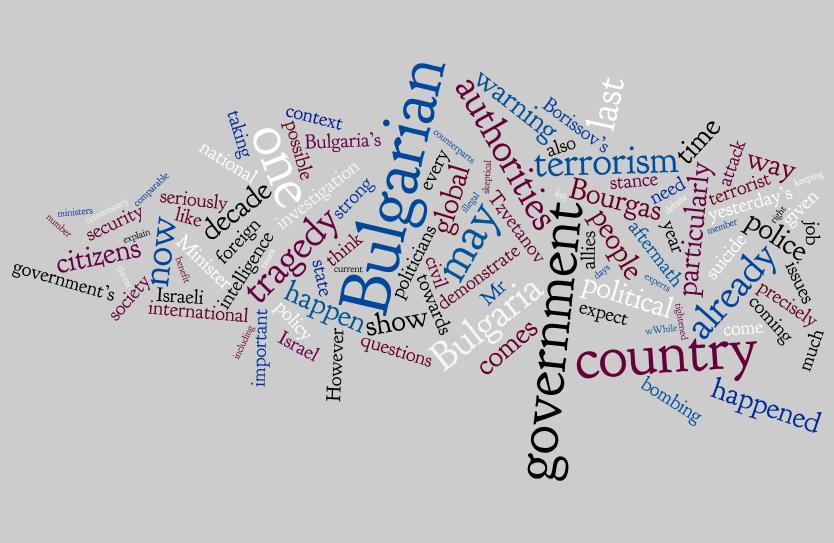“We are no longer an island of tranquility.” This has been one of the most repeated phrases in Bulgarian media after this week’s monstrous suicide attack on Israeli citizens in the Bulgarian city of Burgas. On Wednesday afternoon, an as of yet unidentified suicide bomber attempted to board and then blew up a bag of explosives on a bus full of Israeli tourists. The tourists had just arrived in the country and were about to be driven from the airport to their destination – a popular beach resort. The attack left many injured and claimed 7 lives: the perpetrator’s, the Bulgarian bus driver’s, and those of five Israeli citizens. While the investigation, the accusations, and the responsibility are still to come in the near future, one of the most important questions is already looming on the horizon: what now?
The most important things are already happening, one way or another – priority was given to taking care of the wounded and reaching out to the families of the victims. At the same time, counterterrorist and intelligence experts have flown in from Israel, Western Europe, and the US and have begun aiding the Bulgarian authorities. As of now, there is an official suspect and more clues as to his identity, motives, and possible accomplices are emerging every day. At the same time, there is little that politicians could do about the investigation and it is best if the responsible authorities are left to do their job.
It is far too early to throw conspiracy theories and assign political guilt within the country. Yet many, including prominent opposition politicians, have not shied away from doing exactly that and creating the rather disturbing impression of trying to benefit from the tragedy. Many pundits have also jumped the gun and started calling for ministers to resign, giving the tragedy an unnecessary political coloring. The sad truth remains though, that an act like yesterday’s suicide bombing can happen and has happened anywhere in the world. Not a year goes by without people from around the globe being reminded that terrorism recognizes no national boundaries. But the true test for any government at times like these comes in the aftermath.
![Bulgaria-CIA_WFB_Map [Source: Wikimedia Commons]](https://unitedexplanations.org/english/wp-content/uploads/2012/07/Bulgaria-CIA_WFB_Map-final.jpg) The shock and damage in Bulgaria may not be comparable to some of the more notorious acts of terrorism in the past decade, but it has happened to a country where the people long believed that “this will never happen to us”. And the situation is not improved by the fact that it has happened to a government that has already strained its credibility precisely due to issues in the security sector. Bulgaria is not a police state by any means, but it has had a questionable record over the last few years, particularly in the way it has dealt with major criminal cases. Rife with rumors and scandals involving wiretapping and illegal use of intelligence gadgets, the government now faces a two-fold challenge of the worst kind. It is the cabinet and society’s reaction to the events that will show whether Bulgaria has learned any lessons from the global response to terrorism over the last decade.
The shock and damage in Bulgaria may not be comparable to some of the more notorious acts of terrorism in the past decade, but it has happened to a country where the people long believed that “this will never happen to us”. And the situation is not improved by the fact that it has happened to a government that has already strained its credibility precisely due to issues in the security sector. Bulgaria is not a police state by any means, but it has had a questionable record over the last few years, particularly in the way it has dealt with major criminal cases. Rife with rumors and scandals involving wiretapping and illegal use of intelligence gadgets, the government now faces a two-fold challenge of the worst kind. It is the cabinet and society’s reaction to the events that will show whether Bulgaria has learned any lessons from the global response to terrorism over the last decade.
On the one hand, both citizens and international allies will expect the Bulgarian government to react. Security at critical junctures will most certainly be tightened and, given the affinity of the Minister of Interior, Mr. Tzvetan Tzvetanov, for showcase actions and publicity, one can reasonably expect a lot of visible demonstrations of the government’s renewed and tougher stance. This is the expectation, but in a country where people are quite sensitive about their freedoms and are already skeptical towards the government’s intentions in the area, it may backfire badly. Instead of going down the easy way of a Patriot Act-like legislation or London-style cameras at every corner to demonstrate an uncompromising stance on terrorism, the government should show restraint to curtail civil liberties precisely when it is hardest to do so.
The authorities in Sofia need, instead, to start treating global issues more seriously. It is telling that there was a widely-publicized alert from the Israeli special services to their Bulgarian counterparts in January, eerily warning about a possible terrorist plot against tourists. The timing may have been off, but the warning resounds bitterly today, even if Mr. Tzvetanov was right when he asserted that there was no connection between the warning in the winter and the attack yesterday. However, Prime Minister Borissov made an inadequate remark last year – “The Arab world is doing a lot of business in Bulgaria – there are Oriental fast-food places everywhere. I hope the people who commit terrorist acts will consider that.” – which sounds particularly out of place in the context of the Burgas tragedy. Besides being plainly off-color, Borissov’s words bring the unpleasant feeling that the state has not been taking the problem seriously. If the average Bulgarian did indeed think that this could not happen to them, it was the authorities’ job to think otherwise.
![Armed and dangerous [Image adapted from: ~ggvic~'s Flickr account]](https://unitedexplanations.org/english/wp-content/uploads/2012/07/Flexed-arm2.jpg) Having been a member of NATO and having supported the invasion of Iraqin 2003, Bulgaria had somewhat surprisingly managed to stay out of the global outbreak of terror for the last decade. However, the issue is now suddenly front and center in the national dialogue, and it is up to the government to frame the debate in the coming months. While the temptation to flex muscles and demonstrate police presence is particularly strong in the current political context, the high road would be to engage civil society and explain much more clearly Bulgaria’s position towards the Middle East. Bulgaria’s foreign policy may not have been the direct reason for the accident, but its articulation may turn out to be one of the crucial tasks for the administration in the aftermath of the bombing.
Having been a member of NATO and having supported the invasion of Iraqin 2003, Bulgaria had somewhat surprisingly managed to stay out of the global outbreak of terror for the last decade. However, the issue is now suddenly front and center in the national dialogue, and it is up to the government to frame the debate in the coming months. While the temptation to flex muscles and demonstrate police presence is particularly strong in the current political context, the high road would be to engage civil society and explain much more clearly Bulgaria’s position towards the Middle East. Bulgaria’s foreign policy may not have been the direct reason for the accident, but its articulation may turn out to be one of the crucial tasks for the administration in the aftermath of the bombing.
With regards to the Israel/Palestine conflict, the country is a proponent of the two-state solution. Successive governments have maintained good diplomatic ties with most Arab states, while at the same time keeping the strong historical link with Israel. Explaining, expanding, and if need be, debating the merits of this foreign policy in the broader public space will be much more beneficial to the country than showcasing police force on the streets and performing random security checks. It is a task that would show just how prepared Bulgarian society is to face the questions that the tragedy of the Burgas airport has painfully brought forward.
This is a nonprofit explanation.







Patricia Anderson
I’m proud to read such a thoughtful and measured response from you, old friend. Beautifully written, cogently argued, and a truly disturbing reply from the prime minister that I almost wished I’d remained ignorant of. I was so sorry to hear about this. I’ve been so disturbed by reactions that attempt to place blame and propagate hate by members of my own society (in the wake of our most recent mass shooting this week), this was refreshing. I feel better.